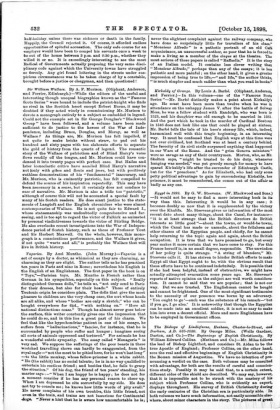Vagaries. By Axel Munthe. (John Murray.)—Vagaries is a set of
essays by a doctor, as whimsical as they are charming, as charming as they are slight. The author tells us he has practised ten years in Paris and nine in Rome ; nevertheless his English is the English of an Englishman. The first paper in the book is on Toys,"—Parisian toys. Mr. Munthe is French rather than German in his sympathies, especially on this subject. "Really distinguished German dolls," he tells us, "not only send to Paris for their dresses, but also for their heads." Those of entirely Teutonic origin he considers plain. The dolls that give the most pleasure to children are the very cheap ones, the sort whose heads are all alike, and whose "bodies are only a sketch," who can be bought everywhere for flicl., "with nothing on." "Here all national distinctions cease." Though he almost never goes below the surface, this writer constantly gives one the impression that he could do so, and in this lies a great part of his charm. We 'feel that like the hypochondriac patient in one of his essays, he suffers from "hallucinations," "fancies, for instance, that he is surrounded by people who suffer and hunger ; imagines seeing all sorts of animals oppressed and tortured." For animals he has a wonderful subtle sympathy. The essay called " Menagerie " is very sad. We suppose the sufferings of the poor beasts in these wretched travelling shows can hardly be exaggerated, from the royal eagle—" not the most to be pitied here, for he won't last long —to the little monkey, whose fellow-prisoner is a white rabbit.
He (the rabbit) has no social talents; he is in no way qualified to -entertain his restless friend ; and besides that, he fails to grasp the situation." Of his dog, the friend of ten years' standing, his master says —"When I am happy he is happy ; he does not for a moment consider if he has any personal reason to cheer up. When I am depressed he sits sorrowfully by my side. He does mot try to console me ; he knows how little words of pity avail." He never complains of his own troubles, this little friend, not even is the train, and trains are not luxurious for Continental dup. "Never a hint that he is aware how uncomfortable he is; never the slightest complaint against the railway company, who have done so surprisingly little for travellers of his class." "Monsieur Alfredo" is a pathetic portrait of an old Cafe acquaintance, an unsuccessful author, so poor that he is forced to make a living as a member of the claque at the theatre. The most serious of these papers is called "Raffaella-" It is the story of an Italian model. It contains less clever writing than "Monsieur Alfredo," perhaps than any of the essays ; it is less pathetic and more painful ; on the other hand, it gives a greater impression of being true to life,—" and life," the author thinks, "is much simpler and much sadder than what you read in books."






































 Previous page
Previous page